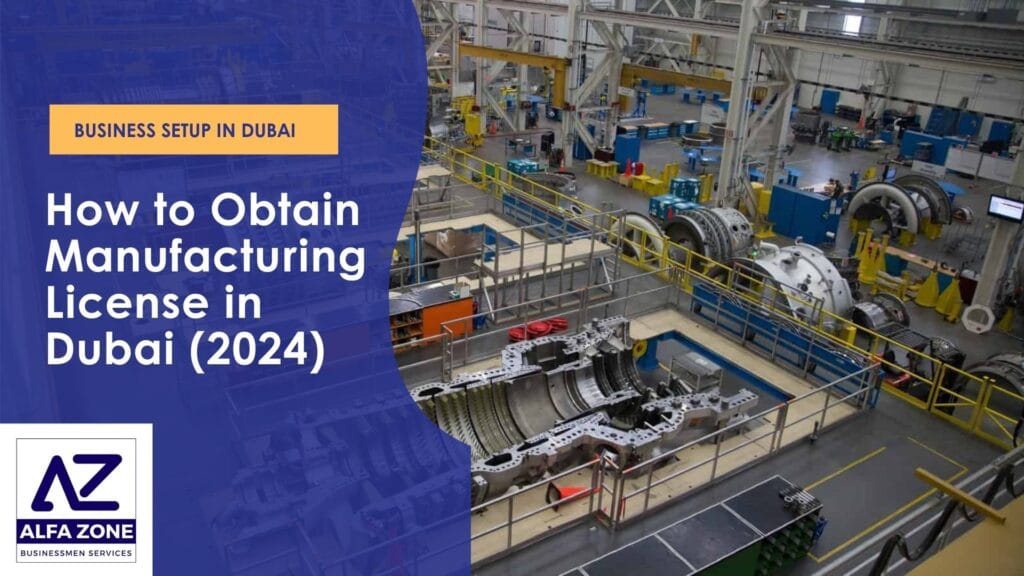How to Obtain a Manufacturing License in Dubai: A Comprehensive Guide
Dubai, one of the most dynamic cities in the world, has firmly established itself as a global business hub. Known for its vibrant economy, strategic location, and pro-business environment, Dubai has become a top destination for entrepreneurs and companies from various industries. Among these sectors, manufacturing is one of the fastest-growing industries in Dubai, providing a plethora of opportunities for businesses looking to tap into the Middle Eastern and global markets. In this comprehensive guide, we will explore the process of obtaining a Manufacturing License in Dubai, including the legal requirements, types of licenses, benefits, and the overall procedure, ensuring your business complies with local regulations while maximizing its potential for growth.
Table of Contents
ToggleWhy Choose Dubai for Manufacturing?
Before diving into the details of how to obtain a Manufacturing License in Dubai, it is essential to understand why Dubai is an ideal location for manufacturing businesses. Here are some compelling reasons:
1. Strategic Location
Dubai is situated at the crossroads of Europe, Asia, and Africa, making it an ideal logistics and distribution hub. This allows manufacturers to access a market of over 2 billion people with ease. The city’s well-connected airports and seaports, such as Jebel Ali Port and Dubai International Airport, provide businesses with efficient transportation options for importing raw materials and exporting finished goods.
2. World-Class Infrastructure
Dubai has invested heavily in developing world-class infrastructure, including industrial zones, warehouses, transportation networks, and power facilities. The city is home to various free zones and specialized industrial areas designed to meet the needs of manufacturing businesses.
3. Business-Friendly Environment
Dubai offers an open and business-friendly environment with minimal bureaucracy, making it easier for companies to set up and operate. The emirate also provides various incentives, such as tax exemptions and 100% foreign ownership in free zones, making it attractive for foreign investors.
4. Access to Skilled Labor
Dubai has a highly diverse and skilled workforce, which includes professionals from all over the world. This allows manufacturers to hire talent that meets their specific business needs.
5. Supportive Government Policies
The government of Dubai actively supports the manufacturing sector as part of its strategic vision to diversify the economy. The authorities have implemented numerous policies and initiatives to encourage local and foreign investment in manufacturing, such as the Dubai Industrial Strategy 2030, which aims to transform Dubai into a global platform for knowledge-based, sustainable industries.
Also Read: Emerging Industries to Start a Business in UAE
Check Out Our Easy Online Business Cost Calculator
What is a Manufacturing License in Dubai?
A Manufacturing License in Dubai is a legal document that allows businesses to engage in industrial and manufacturing activities within the emirate. This license is issued by the Department of Economic Development (DED) for mainland companies, or by one of the specialized free zones, depending on the location of the business.
Holding a manufacturing license permits companies to carry out activities such as producing goods, assembling products, processing raw materials, packaging, and related industrial operations. It is mandatory for any business involved in manufacturing to obtain this license before commencing operations in Dubai.
Types of Manufacturing Licenses in Dubai
In Dubai, there are two primary types of licenses available to manufacturing businesses: Mainland Manufacturing License and Free Zone Manufacturing License. Each has its own advantages, regulations, and procedural requirements.
1. Mainland Manufacturing License in Dubai
A Mainland Manufacturing License is issued by the Department of Economic Development (DED) of Dubai and allows businesses to operate within the Dubai mainland. This license offers businesses the ability to operate anywhere in Dubai, and it is particularly beneficial for companies looking to sell their products within the local market, including government contracts and projects.
Key Features of a Mainland Manufacturing License in Dubai:
- Businesses can operate anywhere in Dubai.
- Access to government contracts and local markets.
- No limitations on the number of visas.
- Requirement for a local Emirati sponsor who holds 51% ownership unless certain exemptions apply.
2. Free Zone Manufacturing License in Dubai
A Free Zone Manufacturing License is issued by one of Dubai’s many free zones, such as the Jebel Ali Free Zone (JAFZA), Meydan Free Zone, or International Free Zone Authority (IFZA). Free zones offer 100% foreign ownership, making them highly attractive to foreign investors. However, businesses in free zones are generally limited to conducting business outside the UAE or within the free zone itself, unless a local distributor is appointed.
Key Features of a Free Zone Manufacturing License:
- 100% foreign ownership.
- Zero customs duty on imports and exports.
- Access to state-of-the-art infrastructure and facilities.
- Exemption from corporate and income taxes.
- No restrictions on repatriation of profits.
Each option has its advantages, and businesses must evaluate their operational needs and market goals to choose the most suitable license.
Also Read: 50 Profitable Business Ideas in Dubai, UAE
Check Out Our Easy Online Business Cost Calculator
Steps to Obtain a Manufacturing License in Dubai
Obtaining a Manufacturing License in Dubai involves several steps, each of which is crucial to ensure the smooth setup and operation of your manufacturing business. The process varies slightly depending on whether you are applying for a mainland or free zone license, but the general steps are outlined below:
1. Determine the Type of Business Activity
The first step in obtaining a manufacturing license is to determine the specific business activities your company will undertake. This will help define the type of license you need, as well as the required permits. Some of the common manufacturing activities include:
- Food and beverage production
- Electronics manufacturing
- Automobile assembly
- Textiles and clothing production
- Chemical manufacturing
- Packaging industries
The activities must align with the legal requirements and regulations set by the authorities in Dubai, including environmental and safety standards.
2. Choose Your Business Location
Next, you need to decide whether you want to establish your business in the mainland or a free zone. This decision is critical as it will determine your ownership structure, operational flexibility, and the benefits you can avail of. If your primary market is the UAE, a mainland license is ideal. On the other hand, if you want to benefit from 100% ownership and focus on export markets, a free zone may be more suitable.
Also Read: How To Start a Manufacturing Business in Dubai
3. Register Your Trade Name
Choosing an appropriate trade name for your business is an important aspect of the registration process. The trade name should comply with the naming conventions set by the DED or the respective free zone authority. Make sure that the name is unique, does not infringe on any trademarks, and reflects the nature of your business. You will need to submit your trade name for approval to the relevant authority.
4. Submit an Initial Approval Application
Once you have determined your business activity, location, and trade name, you must apply for initial approval from the relevant authority (either DED for mainland or free zone authority for a free zone license). The initial approval indicates that the government has no objections to your business activity and that you can proceed with the remaining steps.
5. Prepare the Required Documents
The documentation process is one of the most important steps in obtaining a manufacturing license. The required documents may vary slightly between the mainland and free zones, but the general list includes:
- Passport copies of shareholders and directors
- No Objection Certificate (NOC) from existing sponsor (if applicable)
- Initial approval receipt
- Trade name reservation certificate
- Memorandum of Association (MOA)
- Lease agreement or tenancy contract for manufacturing facilities
- Environmental clearance from the relevant authorities
6. Obtain Special Approvals
Manufacturing businesses in Dubai must comply with specific environmental, safety, and health regulations, depending on the type of activity. Therefore, you may need to obtain approvals from various regulatory bodies such as:
- Dubai Municipality (for health and safety regulations)
- Dubai Civil Defense (for fire safety standards)
- The Ministry of Health (for food or pharmaceutical manufacturing)
- The Department of Environment (for environmental impact assessments)
7. Secure a Manufacturing Facility
To be eligible for a Manufacturing License in Dubai, you must have an industrial space where your manufacturing operations will take place. Depending on the nature of your business, the facility must meet the size, location, and safety standards required by the Dubai government. Industrial areas such as Dubai Industrial City and Al Quoz offer a wide range of warehouses and industrial units tailored to manufacturing needs.
8. Sign a Memorandum of Association (MOA)
For mainland companies, a Memorandum of Association (MOA) must be signed with a local sponsor, unless you qualify for full ownership. This document outlines the roles, responsibilities, and ownership distribution between the shareholders. For free zone companies, an MOA is typically not required, as 100% foreign ownership is allowed.
9. Pay the Fees
Once you have submitted all the necessary documents, you will be required to pay the licensing fees. The cost of a Manufacturing License in Dubai depends on factors such as the type of manufacturing activity, the size of the facility, and the jurisdiction (mainland or free zone). In addition to the license fee, there may be additional costs for approvals, inspections, and government permits.
10. Receive Your Manufacturing License
After completing all the steps and receiving approvals from the relevant authorities, your Manufacturing License in Dubai will be issued. Once you have the license in hand, you can legally start your manufacturing operations.
Also Read: How to Set Up a Cleaning Business in Dubai in 2024
Key Considerations for a Manufacturing Business in Dubai
While obtaining a Manufacturing License in Dubai is a relatively straightforward process, there are several key considerations that businesses must keep in mind to ensure long-term success:
1. Compliance with Environmental Regulations
Manufacturing businesses are subject to stringent environmental regulations, especially those related to waste management, emissions, and water usage. Dubai authorities enforce these regulations to protect the environment and promote sustainable industrial practices. Businesses must ensure that they adhere to these standards and obtain the necessary environmental approvals.
2. Health and Safety Standards
Ensuring a safe working environment is a top priority in Dubai’s industrial sector. Manufacturing companies must comply with health and safety regulations established by Dubai Municipality and other authorities. This includes having adequate fire safety measures, proper ventilation, and emergency evacuation plans.
3. Hiring Skilled Labor
The success of a manufacturing business often depends on having the right workforce. Dubai’s diverse labor market allows businesses to hire skilled workers from different countries, but employers must follow the labor laws of the UAE, including obtaining work visas and ensuring fair treatment of employees.
4. Intellectual Property Protection
Manufacturers in Dubai must take measures to protect their intellectual property (IP) rights. This is particularly important for businesses that deal with proprietary technologies, designs, or processes. The UAE has robust intellectual property laws, and businesses can register their trademarks, patents, and copyrights to safeguard their assets.
Benefits of Obtaining a Manufacturing License in Dubai
There are several advantages to obtaining a Manufacturing License in Dubai that contribute to the growth and profitability of your business. Some of the key benefits include:
1. Access to Global Markets
Dubai’s strategic location and well-developed infrastructure make it an ideal gateway to international markets. Businesses with a manufacturing license can take advantage of the city’s connectivity to export their products to Europe, Asia, Africa, and beyond.
2. Tax Incentives
Dubai offers several tax advantages to manufacturing businesses, including exemptions from corporate and income taxes for companies operating in free zones. Additionally, the UAE’s tax framework is highly favorable for manufacturers, with a low VAT rate of 5% and various incentives available for exports.
3. 100% Foreign Ownership in Free Zones
One of the most significant benefits of setting up a manufacturing business in a Dubai free zone is the ability to retain 100% ownership of your company. This allows foreign investors to maintain complete control over their operations and profits without the need for a local partner.
4. State-of-the-Art Infrastructure
Dubai is home to some of the world’s best industrial facilities, including specialized zones such as Meydan Free Zone and Jebel Ali Free Zone (JAFZA). These areas provide manufacturers with modern infrastructure, warehouses, and access to advanced logistics networks, ensuring efficient production and distribution.
5. Pro-Business Government Policies
The Dubai government is committed to supporting the growth of the manufacturing sector, as evidenced by initiatives like the Dubai Industrial Strategy 2030. This plan aims to increase Dubai’s industrial output and position the city as a global leader in knowledge-based, innovative manufacturing industries.
Also Read: Starting a Healthcare Business in Dubai, UAE: A Comprehensive Guide
Why Work with Alfa Zone?
Obtaining a Manufacturing License in Dubai is a pivotal step toward establishing a successful industrial business in one of the world’s most forward-thinking cities. With its business-friendly environment, strategic location, and world-class infrastructure, Dubai offers a wealth of opportunities for manufacturers to thrive. By following the steps outlined in this guide, ensuring compliance with local regulations, and leveraging the numerous advantages offered by the emirate, you can set your manufacturing business on the path to success in Dubai’s dynamic economy.
Whether you choose to operate on the mainland or in one of Dubai’s many free zones, the potential for growth and profitability in the manufacturing sector is immense. By understanding the licensing process and adhering to the necessary regulations, you can unlock the full potential of your manufacturing venture in Dubai.
For those interested in Obtaining a Manufacturing License in Dubai in 2024, we offer specialized services to help you navigate the complexities of the process. Visit our website to book a free consultation with our experts and learn more about how to Obtain your Manufacturing License in Dubai. You can reach us by calling +971545584399 or sending a WhatsApp message to the same number. For email inquiries, feel free to contact us at info@rework2025.alfazoneuae.com.
By partnering with Alfa Zone, you ensure that your business setup journey is smooth, efficient, and compliant with all regulatory requirements, allowing you to focus on growing your Manufacturing Business in Dubai.
Check Out Our Easy Online Business Cost Calculator
For more information, visit Alfa Zone.
Also Read: Business Setup in Dubai in 2024: A Comprehensive Guide



